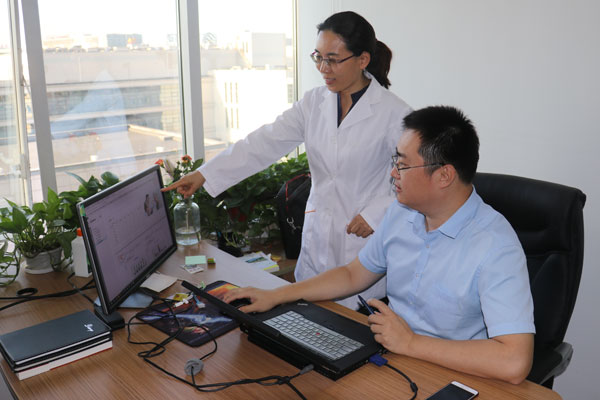AI set to revolutionize healthcare industry in China

 |
| Li Xiaoxia, left, founder and CEO of Beijing Koboro Health Science and Technology, talks with Yang Song, product director of Koboro, in Beijing on Sept 6, 2017. [Photo/chinadaily.com.cn] |
Having a clear picture about one's own health and control over one's overall health management - including prevention and prognosis - is a dream of many people, especially when it takes hours to register for a five-minute doctor's visit.
"Artificial intelligence (AI) makes it possible for people to receive a checkup in offices and receive medical advice online, which can lead to a revolution of the healthcare industry in China," said Li Xiaoxia, founder of Beijing Koboro Health Science and Technology.
A Beijing-based tech startup, Koboro has developed an app called "Daxia Health" which uses a combination of artificial intelligence and machine learning to provide medical services, according to Li.
"The AI technology-supported 'Daxia Health' application can help analyze and process large amounts of health data collected from the clients and give precise, individualized recommendations which are checked by human doctors to guarantee accuracy," Li said.
The technology can greatly improve efficiency for both doctors and patients and transform the healthcare industry, added Li. She has recently been rated as a top 10 female entrepreneur in tech in a report released by Ali Research Institute, China Entrep Mulan Club and Alibaba Innovation Center.
Big companies like Google, Microsoft and Alibaba have started to tap into the AI-powered medical care market in recent years, Xinhua reported.
"Although healthcare big data systems are still in their infancy across the world, China has an opportunity to take a leading role. China's increasing senior population provides a large amount of data," Li said.
China had more than 230 million people aged 60 or above at the end of 2016,16.7 percent of the total population, according to the Ministry of Civil Affairs. Elderly people in China are expected to account for about one quarter of the population by 2030, Xinhua reported.
"All the products of Koboro are based on fundamental needs of doctors and use the 'Internet Plus healthcare' model to achieve the ultimate goal of helping clients stay healthy in a full life cycle," product director Yang Song said.
Koboro divides clients' life cycles into 13 stages from a half year before birth to more than 90 years old. Clients at different stages can receive professional medical suggestions, running the gamut from Western medicine to traditional Chinese medicine, Li said.
Liang Wei, a health management doctor at Koboro, displayed a health report of a 26-year-old female whose "body age" is about 51 years old.
"Based on this person's health check and basic information, the AI-supported system can predict the risks for her to get certain diseases. Our health management team, including sports specialists and nutritionists, can give detailed recommendations to prevent these diseases," Liang said.
The recommendations could be so detailed that the client would know the hours she should walk, the number of steps to walk each day for exercise and the kinds and amounts of food she should eat, Li said.
Li Xiaoxia said the profit rate of Koboro was between 30 and 40 percent in the first two years after its establishment in 2012. She has invested recent years' profits in AI-supported systems and relevant products.
Li, who is confident in the future of Koboro, said the profits can be in the tens of millions or even several billion in the future, as internet healthcare can generate profits from various channels, such as health management services and healthcare products.
Inspired by her father, who used to be a barefoot doctor, Li also wants to have a close relationship with patients by being there whenever they need support. This is difficult when people are busy and fly to different places.
"Thanks to developments in data, AI and internet technology, it is possible to standardize the process to prevent and control chronic diseases and establish a healthcare platform online to benefit more ordinary people in China," Li said.
The great business opportunities emerging in the industry in China also come from the Chinese government's support, Li added.
In Oct 2016, Chinese authorities released "Healthy China 2030", a blueprint that aims to improve the health of the people. The blueprint covers areas such as public health services, the medical industry and food and drug safety, China Daily reported.
This document is not only the first national-level medium- to long-term strategic plan in the health sector since 1949, but also demonstrates the political commitment of China to participate in global health governance and fulfill the United Nation's Sustainable Development Goals agenda, according to the World Health Organization.




































